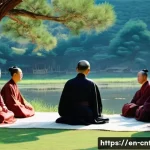Okay, here’s a blog-style introduction comparing Taoism and Christianity, keeping your guidelines in mind:Ever found yourself pondering the universe’s biggest questions, like where we came from and what our purpose is?
Well, Taoism and Christianity, despite originating from completely different corners of the globe, both offer profound answers to these very questions.
I’ve always been fascinated by how these two philosophies, one deeply rooted in Eastern traditions and the other a cornerstone of Western thought, approach spirituality and the human condition.
From the concept of “the Way” in Taoism to the Christian belief in a personal God, the contrasts are stark yet surprisingly complementary. Having delved into both, I’ve discovered some amazing parallels and distinctions.
Let’s get to the bottom of this and discover the core differences and similarities! Let’s explore this topic in more detail in the rest of this blog!
Divergent Paths to the Divine: A Comparative Look at Core Beliefs

1. Understanding the Nature of Ultimate Reality
Taoism, at its heart, centers on the Tao, often translated as “the Way.” It’s not a personal god but rather an indescribable, ever-flowing cosmic principle that underlies all existence.
Imagine a river that carves its own path through the mountains – that’s the Tao. It emphasizes living in harmony with nature and the natural order of things.
Christianity, on the other hand, focuses on a personal God who is the creator and sustainer of the universe. This God is actively involved in the world and has a direct relationship with humanity.
I remember attending a lecture once where the speaker described the Tao as “the music of the universe,” something you feel and resonate with, while the Christian God was presented as “the composer,” intentionally shaping and guiding the symphony.
Personally, I find the Tao’s abstractness incredibly appealing, a vast ocean of potential, whereas the Christian God offers a sense of comfort and guidance through His defined principles and commandments.
It’s like choosing between exploring an uncharted forest (Taoism) or following a well-marked path (Christianity).
2. The Role of Humanity in the Cosmos
In Taoism, humans are seen as an integral part of nature, neither superior nor separate from it. The ideal is to live in accordance with the Tao, embracing simplicity and spontaneity.
Think of it like gardening: you nurture the plants, but you don’t force them to grow. You work with the natural processes. In Christianity, humans are created in God’s image and have a unique role in creation.
We are called to be stewards of the Earth and to love and serve God and our neighbors. I recall a conversation with a friend who was deeply involved in environmental activism.
He found inspiration in both Taoism’s emphasis on harmony with nature and Christianity’s call to stewardship, seeing them as complementary approaches to caring for the planet.
To me, the Taoist perspective offers a sense of interconnectedness and humility, while the Christian view provides a sense of purpose and responsibility.
I think of Taoism as saying, “We are all part of the same fabric,” and Christianity as saying, “We have a special role to play in weaving that fabric.”
Moral Compass: Ethical Frameworks in Taoism and Christianity
1. Defining Good and Evil
Taoism doesn’t have a strict concept of good and evil. Instead, it emphasizes balance and harmony. Actions that disrupt the natural order are seen as undesirable.
It’s more about living in accordance with the Tao, which inherently leads to virtuous behavior. Imagine a seesaw: if one side is too high, it disrupts the balance.
Christianity defines good and evil in terms of God’s will. Actions that align with God’s commandments are considered good, while those that violate them are evil.
This often involves concepts of love, justice, and mercy. A former Sunday school teacher once told me that the key to understanding Christian ethics is to ask, “What would Jesus do?” This approach provides a clear framework for moral decision-making.
I’ve always felt that Taoism offers a more flexible and intuitive approach to ethics, while Christianity provides a more structured and defined system.
To me, Taoism is like navigating by the stars, while Christianity is like following a detailed map.
2. The Path to Virtue
Taoism emphasizes cultivating inner virtues like compassion, humility, and simplicity. This is achieved through practices like meditation and living in harmony with nature.
The goal is to become a “sage” who embodies the Tao. I remember reading about a Taoist hermit who lived in the mountains, practicing meditation and living off the land.
His life seemed incredibly peaceful and fulfilling, a testament to the power of living in accordance with the Tao. Christianity emphasizes virtues like love, faith, and hope.
These are cultivated through prayer, worship, and following God’s commandments. The goal is to become more Christ-like. I’ve been deeply moved by stories of Christians who have dedicated their lives to serving others, embodying the love and compassion of Jesus.
I see Taoism as emphasizing inner transformation through self-cultivation, while Christianity emphasizes transformation through a relationship with God.
It’s like Taoism says, “Cultivate your inner garden,” and Christianity says, “Let God cultivate your soul.”
Practices and Rituals: Expressing Faith and Finding Meaning
1. Rituals and Ceremonies
Taoism involves various rituals and ceremonies aimed at connecting with the Tao and promoting harmony. These can include meditation, chanting, and offerings.
I once attended a Taoist ceremony in a local temple, and the atmosphere was incredibly serene and peaceful. The chanting and incense created a sense of connection to something larger than myself.
Christianity involves rituals like baptism, communion, and prayer. These practices are seen as ways to connect with God and to express faith. My experiences attending church services have often left me feeling uplifted and connected to a community of believers.
I find that Taoist rituals often emphasize a sense of personal connection to nature, while Christian rituals emphasize a sense of communal connection to God.
Taoism is like a quiet meditation in nature, and Christianity is like a joyful celebration with friends and family.
2. The Importance of Prayer and Meditation
Meditation is a key practice in Taoism, aimed at quieting the mind and connecting with the Tao. It’s about finding stillness and inner peace. I’ve found that even just a few minutes of daily meditation can significantly reduce stress and improve my overall sense of well-being.
Christianity emphasizes prayer as a way to communicate with God, seeking guidance, comfort, and strength. I’ve often turned to prayer during difficult times, finding solace and hope in my connection with God.
To me, Taoist meditation is like listening to the quiet whispers of the universe, while Christian prayer is like having a conversation with a trusted friend.
Taoism encourages inner reflection, while Christianity encourages outward communication.
The Concept of Afterlife: What Happens When We Die?
1. Visions of the Beyond
Taoism doesn’t have a clear-cut concept of the afterlife. Some Taoists believe in reincarnation, while others believe that the soul merges back with the Tao.
It’s more about living in harmony with the present moment than worrying about what happens after death. I remember reading a Taoist text that described death as simply returning to the source, like a drop of water returning to the ocean.
Christianity believes in an afterlife where believers go to heaven to be with God, while non-believers face eternal separation from God. This belief provides hope and comfort for many Christians.
I once spoke with a pastor who had lost his wife to cancer. He found solace in the belief that she was now in heaven, free from suffering. I see Taoism as offering a sense of acceptance and peace with the unknown, while Christianity offers a sense of hope and promise for the future.
Taoism says, “We are all part of the eternal cycle,” and Christianity says, “We have a home waiting for us in heaven.”
2. Living in the Present vs. Preparing for the Future
Taoism emphasizes living in the present moment, embracing simplicity and spontaneity. It’s about finding joy and meaning in everyday life. I’ve found that practicing mindfulness, a key aspect of Taoist philosophy, has helped me appreciate the beauty of the present moment.
Christianity emphasizes living a life that is pleasing to God, preparing for the afterlife. This involves following God’s commandments, loving others, and spreading the gospel.
I’ve been inspired by stories of Christians who have dedicated their lives to serving the poor and oppressed, living out their faith in practical ways.
In my view, Taoism encourages us to fully embrace the present, while Christianity encourages us to live with an eye toward the future. Taoism says, “Be here now,” and Christianity says, “Live for eternity.”
Practical Application: How These Philosophies Impact Daily Life
1. Harmony in Relationships
Taoism teaches the importance of living in harmony with others, embracing humility and compassion. This can lead to more peaceful and fulfilling relationships.
I’ve found that practicing empathy, a key aspect of Taoist philosophy, has helped me better understand and connect with others. Christianity teaches the importance of loving others as ourselves, forgiving those who have wronged us, and serving those in need.
This can lead to stronger and more meaningful relationships. I’ve been inspired by stories of Christians who have shown incredible forgiveness and compassion, even in the face of great adversity.
To me, Taoism encourages us to cultivate inner harmony, which then radiates outward to our relationships, while Christianity encourages us to actively love and serve others, building stronger connections through faith.
2. Finding Purpose and Meaning
Taoism encourages us to find our own path, aligning with the Tao and embracing our unique talents and abilities. It’s about living authentically and finding joy in our individual journey.
I’ve found that exploring my passions and pursuing my interests has helped me feel more fulfilled and alive. Christianity teaches that our purpose is to love God and to serve others, living a life that glorifies Him.
This provides a clear sense of direction and meaning. I’ve been inspired by stories of Christians who have dedicated their lives to serving a higher purpose, making a positive impact on the world.
In my experience, Taoism encourages us to discover our own unique purpose, while Christianity provides a clear and defined purpose. Taoism says, “Find your own way,” and Christianity says, “Follow God’s path.”
Contrasting Perspectives on Ego and Self
1. The Role of the Individual
In Taoism, the ego is often seen as an obstacle to enlightenment, a barrier that separates us from the natural flow of the Tao. Think of it like a dam that blocks the river – it disrupts the natural course of things.
The goal is to transcend the ego, to become more selfless and connected to the universe. I once attended a workshop on mindfulness where the instructor emphasized the importance of letting go of our attachments to our identities and embracing a more fluid sense of self.
This resonated deeply with the Taoist perspective. Christianity, on the other hand, acknowledges the importance of the individual but emphasizes the need to submit to God’s will.
It’s about recognizing that we are created in God’s image but also recognizing our limitations and dependence on Him. I recall a sermon I heard once that described the ego as a tool that can be used for good or evil.
It’s about using our gifts and talents to serve God and others, rather than becoming consumed by pride or selfishness. To me, Taoism seems to encourage a more detached and impersonal view of the self, while Christianity offers a more balanced view that acknowledges the value of the individual but emphasizes the importance of humility and submission.
2. Overcoming Selfishness
Taoism suggests that selfishness arises from clinging to our ego, from identifying too strongly with our individual desires and needs. The key to overcoming selfishness is to let go of these attachments and to cultivate compassion and empathy for others.
I’ve found that practicing acts of kindness, even small ones, has helped me to feel more connected to others and less focused on my own needs. Christianity teaches that selfishness is a form of sin, a violation of God’s commandment to love our neighbors as ourselves.
The key to overcoming selfishness is to seek forgiveness for our sins, to ask God for help in overcoming our selfish tendencies, and to actively serve others in need.
I’ve been inspired by stories of Christians who have given up their own comforts and possessions to help those less fortunate. To me, Taoism and Christianity both offer powerful insights into the nature of selfishness and provide practical guidance for overcoming it.
| Aspect | Taoism | Christianity |
|---|---|---|
| Nature of Ultimate Reality | The Tao (The Way): an impersonal, cosmic principle | A personal God: creator and sustainer of the universe |
| Role of Humanity | Integral part of nature, living in harmony with the Tao | Created in God’s image, stewards of the Earth, loving and serving God and neighbors |
| Ethics | Balance and harmony, avoiding disruption of the natural order | Good and evil defined by God’s will, emphasizing love, justice, and mercy |
| Virtues | Compassion, humility, simplicity | Love, faith, hope |
| Practices | Meditation, chanting, living in harmony with nature | Prayer, worship, following God’s commandments |
| Afterlife | Varied beliefs: reincarnation or merging with the Tao | Heaven for believers, eternal separation from God for non-believers |
| Emphasis | Living in harmony with nature and the present moment | Living a life pleasing to God, preparing for the afterlife |
Finding Common Ground: Shared Values and Complementary Perspectives
1. The Golden Rule: A Universal Principle
Despite their differences, both Taoism and Christianity share a common thread: the Golden Rule, which emphasizes treating others as we would like to be treated.
In Taoism, this is expressed through the concept of compassion and empathy, while in Christianity, it’s embodied in the commandment to love our neighbors as ourselves.
I remember reading a quote by Lao Tzu, the founder of Taoism, that said, “Regard your neighbor’s gain as your own gain, and your neighbor’s loss as your own loss.” This sentiment perfectly encapsulates the spirit of the Golden Rule.
Christianity emphasizes the importance of putting others before ourselves, of sacrificing our own needs for the sake of others.
2. Seeking Wisdom and Understanding
Both Taoism and Christianity encourage us to seek wisdom and understanding, to question our assumptions, and to grow in knowledge and insight. In Taoism, this is achieved through meditation, contemplation, and living in harmony with nature, while in Christianity, it’s achieved through prayer, studying the Bible, and seeking guidance from the Holy Spirit.
I think the pursuit of wisdom is a lifelong journey, and both Taoism and Christianity offer valuable tools and perspectives for navigating this path.
Personal Reflections: Integrating Taoist and Christian Principles
1. Finding Balance and Harmony in a Modern World
In today’s fast-paced and chaotic world, it can be challenging to find balance and harmony. However, by integrating principles from both Taoism and Christianity, we can cultivate a more peaceful and fulfilling life.
I’ve found that practicing mindfulness, a key aspect of Taoist philosophy, has helped me to stay grounded in the present moment and to appreciate the simple things in life.
I’ve also found that praying and seeking guidance from God, a key aspect of Christian faith, has given me strength and hope during difficult times. In my experience, integrating Taoist and Christian principles has helped me to navigate the challenges of modern life with greater peace, purpose, and resilience.
2. The Ongoing Journey of Faith and Self-Discovery
Ultimately, the journey of faith and self-discovery is a personal one, and there is no one-size-fits-all approach. Whether we resonate more with Taoism, Christianity, or a combination of both, the key is to remain open to learning, to embrace new experiences, and to continually strive to become the best versions of ourselves.
I believe that by exploring different spiritual traditions and philosophies, we can gain a deeper understanding of ourselves, the world around us, and our place in the universe.
Divergent Paths to the Divine: A Comparative Look at Core BeliefsUnderstanding the Nature of Ultimate RealityTaoism, at its heart, centers on the Tao, often translated as “the Way.” It’s not a personal god but rather an indescribable, ever-flowing cosmic principle that underlies all existence.
Imagine a river that carves its own path through the mountains – that’s the Tao. It emphasizes living in harmony with nature and the natural order of things.
Christianity, on the other hand, focuses on a personal God who is the creator and sustainer of the universe. This God is actively involved in the world and has a direct relationship with humanity.
I remember attending a lecture once where the speaker described the Tao as “the music of the universe,” something you feel and resonate with, while the Christian God was presented as “the composer,” intentionally shaping and guiding the symphony.
Personally, I find the Tao’s abstractness incredibly appealing, a vast ocean of potential, whereas the Christian God offers a sense of comfort and guidance through His defined principles and commandments.
It’s like choosing between exploring an uncharted forest (Taoism) or following a well-marked path (Christianity). The Role of Humanity in the CosmosIn Taoism, humans are seen as an integral part of nature, neither superior nor separate from it.
The ideal is to live in accordance with the Tao, embracing simplicity and spontaneity. Think of it like gardening: you nurture the plants, but you don’t force them to grow.
You work with the natural processes. In Christianity, humans are created in God’s image and have a unique role in creation. We are called to be stewards of the Earth and to love and serve God and our neighbors.
I recall a conversation with a friend who was deeply involved in environmental activism. He found inspiration in both Taoism’s emphasis on harmony with nature and Christianity’s call to stewardship, seeing them as complementary approaches to caring for the planet.
To me, the Taoist perspective offers a sense of interconnectedness and humility, while the Christian view provides a sense of purpose and responsibility.
I think of Taoism as saying, “We are all part of the same fabric,” and Christianity as saying, “We have a special role to play in weaving that fabric.”Moral Compass: Ethical Frameworks in Taoism and ChristianityDefining Good and EvilTaoism doesn’t have a strict concept of good and evil.
Instead, it emphasizes balance and harmony. Actions that disrupt the natural order are seen as undesirable. It’s more about living in accordance with the Tao, which inherently leads to virtuous behavior.
Imagine a seesaw: if one side is too high, it disrupts the balance. Christianity defines good and evil in terms of God’s will. Actions that align with God’s commandments are considered good, while those that violate them are evil.
This often involves concepts of love, justice, and mercy. A former Sunday school teacher once told me that the key to understanding Christian ethics is to ask, “What would Jesus do?” This approach provides a clear framework for moral decision-making.
I’ve always felt that Taoism offers a more flexible and intuitive approach to ethics, while Christianity provides a more structured and defined system.
To me, Taoism is like navigating by the stars, while Christianity is like following a detailed map. The Path to VirtueTaoism emphasizes cultivating inner virtues like compassion, humility, and simplicity.
This is achieved through practices like meditation and living in harmony with nature. The goal is to become a “sage” who embodies the Tao. I remember reading about a Taoist hermit who lived in the mountains, practicing meditation and living off the land.
His life seemed incredibly peaceful and fulfilling, a testament to the power of living in accordance with the Tao. Christianity emphasizes virtues like love, faith, and hope.
These are cultivated through prayer, worship, and following God’s commandments. The goal is to become more Christ-like. I’ve been deeply moved by stories of Christians who have dedicated their lives to serving others, embodying the love and compassion of Jesus.
I see Taoism as emphasizing inner transformation through self-cultivation, while Christianity emphasizes transformation through a relationship with God.
It’s like Taoism says, “Cultivate your inner garden,” and Christianity says, “Let God cultivate your soul.”Practices and Rituals: Expressing Faith and Finding MeaningRituals and CeremoniesTaoism involves various rituals and ceremonies aimed at connecting with the Tao and promoting harmony.
These can include meditation, chanting, and offerings. I once attended a Taoist ceremony in a local temple, and the atmosphere was incredibly serene and peaceful.
The chanting and incense created a sense of connection to something larger than myself. Christianity involves rituals like baptism, communion, and prayer.
These practices are seen as ways to connect with God and to express faith. My experiences attending church services have often left me feeling uplifted and connected to a community of believers.
I find that Taoist rituals often emphasize a sense of personal connection to nature, while Christian rituals emphasize a sense of communal connection to God.
Taoism is like a quiet meditation in nature, and Christianity is like a joyful celebration with friends and family. The Importance of Prayer and MeditationMeditation is a key practice in Taoism, aimed at quieting the mind and connecting with the Tao.
It’s about finding stillness and inner peace. I’ve found that even just a few minutes of daily meditation can significantly reduce stress and improve my overall sense of well-being.
Christianity emphasizes prayer as a way to communicate with God, seeking guidance, comfort, and strength. I’ve often turned to prayer during difficult times, finding solace and hope in my connection with God.
To me, Taoist meditation is like listening to the quiet whispers of the universe, while Christian prayer is like having a conversation with a trusted friend.
Taoism encourages inner reflection, while Christianity encourages outward communication. The Concept of Afterlife: What Happens When We Die? Visions of the BeyondTaoism doesn’t have a clear-cut concept of the afterlife.
Some Taoists believe in reincarnation, while others believe that the soul merges back with the Tao. It’s more about living in harmony with the present moment than worrying about what happens after death.
I remember reading a Taoist text that described death as simply returning to the source, like a drop of water returning to the ocean. Christianity believes in an afterlife where believers go to heaven to be with God, while non-believers face eternal separation from God.
This belief provides hope and comfort for many Christians. I once spoke with a pastor who had lost his wife to cancer. He found solace in the belief that she was now in heaven, free from suffering.
I see Taoism as offering a sense of acceptance and peace with the unknown, while Christianity offers a sense of hope and promise for the future. Taoism says, “We are all part of the eternal cycle,” and Christianity says, “We have a home waiting for us in heaven.”Living in the Present vs.
Preparing for the FutureTaoism emphasizes living in the present moment, embracing simplicity and spontaneity. It’s about finding joy and meaning in everyday life.
I’ve found that practicing mindfulness, a key aspect of Taoist philosophy, has helped me appreciate the beauty of the present moment. Christianity emphasizes living a life that is pleasing to God, preparing for the afterlife.
This involves following God’s commandments, loving others, and spreading the gospel. I’ve been inspired by stories of Christians who have dedicated their lives to serving the poor and oppressed, living out their faith in practical ways.
In my view, Taoism encourages us to fully embrace the present, while Christianity encourages us to live with an eye toward the future. Taoism says, “Be here now,” and Christianity says, “Live for eternity.”Practical Application: How These Philosophies Impact Daily LifeHarmony in RelationshipsTaoism teaches the importance of living in harmony with others, embracing humility and compassion.
This can lead to more peaceful and fulfilling relationships. I’ve found that practicing empathy, a key aspect of Taoist philosophy, has helped me better understand and connect with others.
Christianity teaches the importance of loving others as ourselves, forgiving those who have wronged us, and serving those in need. This can lead to stronger and more meaningful relationships.
I’ve been inspired by stories of Christians who have shown incredible forgiveness and compassion, even in the face of great adversity. To me, Taoism encourages us to cultivate inner harmony, which then radiates outward to our relationships, while Christianity encourages us to actively love and serve others, building stronger connections through faith.
Finding Purpose and MeaningTaoism encourages us to find our own path, aligning with the Tao and embracing our unique talents and abilities. It’s about living authentically and finding joy in our individual journey.
I’ve found that exploring my passions and pursuing my interests has helped me feel more fulfilled and alive. Christianity teaches that our purpose is to love God and to serve others, living a life that glorifies Him.
This provides a clear sense of direction and meaning. I’ve been inspired by stories of Christians who have dedicated their lives to serving a higher purpose, making a positive impact on the world.
In my experience, Taoism encourages us to discover our own unique purpose, while Christianity provides a clear and defined purpose. Taoism says, “Find your own way,” and Christianity says, “Follow God’s path.”Contrasting Perspectives on Ego and SelfThe Role of the IndividualIn Taoism, the ego is often seen as an obstacle to enlightenment, a barrier that separates us from the natural flow of the Tao.
Think of it like a dam that blocks the river – it disrupts the natural course of things. The goal is to transcend the ego, to become more selfless and connected to the universe.
I once attended a workshop on mindfulness where the instructor emphasized the importance of letting go of our attachments to our identities and embracing a more fluid sense of self.
This resonated deeply with the Taoist perspective. Christianity, on the other hand, acknowledges the importance of the individual but emphasizes the need to submit to God’s will.
It’s about recognizing that we are created in God’s image but also recognizing our limitations and dependence on Him. I recall a sermon I heard once that described the ego as a tool that can be used for good or evil.
It’s about using our gifts and talents to serve God and others, rather than becoming consumed by pride or selfishness. To me, Taoism seems to encourage a more detached and impersonal view of the self, while Christianity offers a more balanced view that acknowledges the value of the individual but emphasizes the importance of humility and submission.
Overcoming Selfishness
Taoism suggests that selfishness arises from clinging to our ego, from identifying too strongly with our individual desires and needs.
The key to overcoming selfishness is to let go of these attachments and to cultivate compassion and empathy for others. I’ve found that practicing acts of kindness, even small ones, has helped me to feel more connected to others and less focused on my own needs.
Christianity teaches that selfishness is a form of sin, a violation of God’s commandment to love our neighbors as ourselves. The key to overcoming selfishness is to seek forgiveness for our sins, to ask God for help in overcoming our selfish tendencies, and to actively serve others in need.
I’ve been inspired by stories of Christians who have given up their own comforts and possessions to help those less fortunate. To me, Taoism and Christianity both offer powerful insights into the nature of selfishness and provide practical guidance for overcoming it.
Finding Common Ground: Shared Values and Complementary PerspectivesThe Golden Rule: A Universal Principle
Despite their differences, both Taoism and Christianity share a common thread: the Golden Rule, which emphasizes treating others as we would like to be treated.
In Taoism, this is expressed through the concept of compassion and empathy, while in Christianity, it’s embodied in the commandment to love our neighbors as ourselves.
I remember reading a quote by Lao Tzu, the founder of Taoism, that said, “Regard your neighbor’s gain as your own gain, and your neighbor’s loss as your own loss.” This sentiment perfectly encapsulates the spirit of the Golden Rule.
Christianity emphasizes the importance of putting others before ourselves, of sacrificing our own needs for the sake of others. Seeking Wisdom and UnderstandingBoth Taoism and Christianity encourage us to seek wisdom and understanding, to question our assumptions, and to grow in knowledge and insight.
In Taoism, this is achieved through meditation, contemplation, and living in harmony with nature, while in Christianity, it’s achieved through prayer, studying the Bible, and seeking guidance from the Holy Spirit.
I think the pursuit of wisdom is a lifelong journey, and both Taoism and Christianity offer valuable tools and perspectives for navigating this path. Personal Reflections: Integrating Taoist and Christian PrinciplesFinding Balance and Harmony in a Modern WorldIn today’s fast-paced and chaotic world, it can be challenging to find balance and harmony.
However, by integrating principles from both Taoism and Christianity, we can cultivate a more peaceful and fulfilling life. I’ve found that practicing mindfulness, a key aspect of Taoist philosophy, has helped me to stay grounded in the present moment and to appreciate the simple things in life.
I’ve also found that praying and seeking guidance from God, a key aspect of Christian faith, has given me strength and hope during difficult times. In my experience, integrating Taoist and Christian principles has helped me to navigate the challenges of modern life with greater peace, purpose, and resilience.
The Ongoing Journey of Faith and Self-DiscoveryUltimately, the journey of faith and self-discovery is a personal one, and there is no one-size-fits-all approach.
Whether we resonate more with Taoism, Christianity, or a combination of both, the key is to remain open to learning, to embrace new experiences, and to continually strive to become the best versions of ourselves.
I believe that by exploring different spiritual traditions and philosophies, we can gain a deeper understanding of ourselves, the world around us, and our place in the universe.
In Conclusion
Exploring the contrasting yet complementary paths of Taoism and Christianity offers a rich tapestry of insights for navigating life’s complexities. Whether drawing wisdom from the Taoist emphasis on harmony and the present moment, or the Christian call to love and service, both traditions provide valuable guidance. Ultimately, the journey of faith and self-discovery is a personal one, enriched by open-mindedness and a willingness to learn from diverse spiritual perspectives.
By integrating aspects of both philosophies, we can cultivate a balanced and fulfilling life, marked by inner peace, meaningful relationships, and a deep sense of purpose. The synthesis of these ancient wisdom traditions empowers us to embrace the present, prepare for the future, and live in accordance with our highest values.
Useful Information
1. Local Temples and Churches: Discover local Taoist temples and Christian churches in your area for community and learning.
2. Books on Comparative Religion: Explore books that delve into the similarities and differences between Taoism and Christianity.
3. Meditation and Prayer Groups: Join meditation groups for Taoist practices and prayer groups for Christian faith.
4. Community Service Opportunities: Participate in local community service projects inspired by Christian values of helping others.
5. Mindfulness Workshops: Attend workshops to learn and practice mindfulness techniques from Taoist philosophy.
Key Takeaways
Nature of Ultimate Reality: Taoism focuses on the impersonal Tao, while Christianity centers on a personal God.
Ethical Frameworks: Taoism emphasizes balance and harmony, while Christianity emphasizes God’s will and love.
Practices and Rituals: Taoism involves meditation, while Christianity involves prayer and worship.
Afterlife: Taoism has varied beliefs, while Christianity believes in heaven and eternal separation.
Shared Values: Both traditions share the Golden Rule and encourage the pursuit of wisdom.
Frequently Asked Questions (FAQ) 📖
Q: If Taoism emphasizes living in harmony with nature, does that mean Christians are encouraged to disregard the environment?
A: Not at all! While Taoism places a strong emphasis on living in accordance with nature’s rhythms, Christianity also teaches stewardship of the Earth. The Bible emphasizes responsible care for creation.
Though their approaches might differ in expression, both ultimately encourage respect for and conservation of the natural world. Think of it this way, a Taoist might meditate by a river to connect with its essence, while a Christian might organize a community cleanup of that same river as an act of service and responsibility.
Q: Is it fair to say that Taoism is just about being passive and letting things happen, while Christianity is all about actively changing the world?
A: That’s a common misconception about both! Taoism isn’t about complete passivity. It’s more about understanding the natural flow of things and acting in alignment with that flow – a sort of “go with the flow” mentality.
Christianity, while certainly encouraging positive change and action, also recognizes the importance of acceptance and surrendering to God’s will. I’ve seen countless examples of Christians who, while working hard to improve their communities, also emphasize prayer and trusting in a higher power to guide their efforts.
It’s a balance!
Q: I’ve heard that Taoism doesn’t really have rules, while Christianity has a lot of commandments. Is this true?
A: While Christianity does have a clear set of commandments and moral guidelines, it’s not simply a rigid set of rules. It’s more about a relationship with God and living a life that reflects love and compassion.
Taoism doesn’t have explicit commandments like “Thou shalt not…”, but it does have principles that guide ethical behavior, such as living simply, avoiding excess, and respecting the balance of nature.
In my experience, the “rules” in both philosophies are more about encouraging a certain way of living and being, rather than a strict list of dos and don’ts.
Consider it like the difference between following a recipe strictly versus using a recipe as inspiration to create something even better.
📚 References
Wikipedia Encyclopedia
구글 검색 결과
구글 검색 결과
구글 검색 결과
구글 검색 결과
구글 검색 결과






